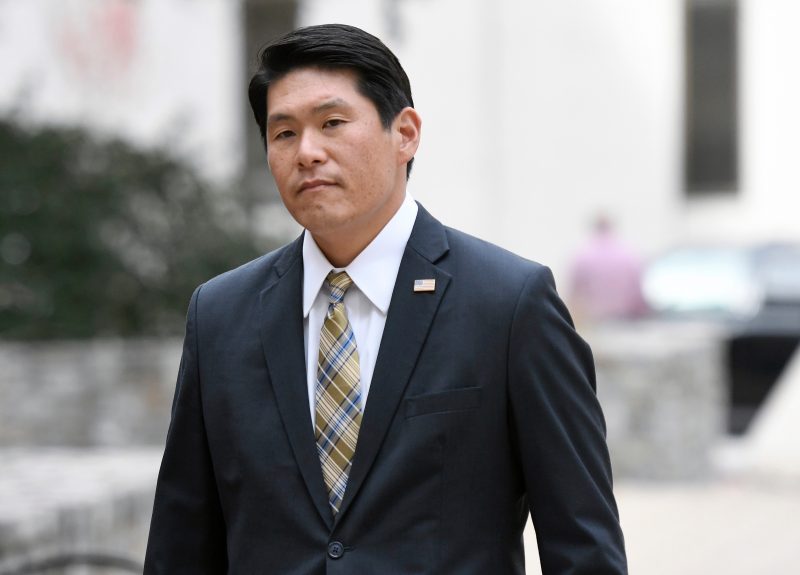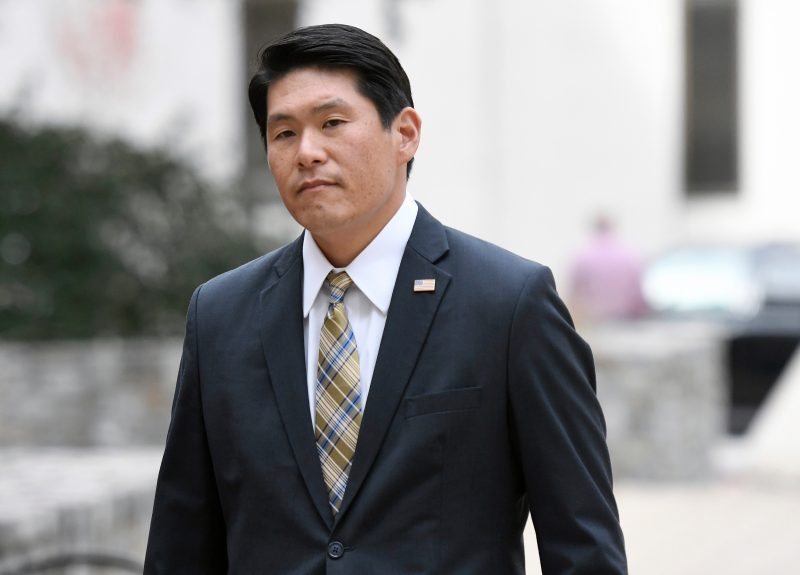
President Biden, during interviews with the special counsel investigating his handling of classified documents, had trouble recalling the years he served as vice president. He could not pinpoint, even within several years, when his son Beau had died. His memory about a crucial debate on troop levels in Afghanistan was hazy.
The first day of questioning, at the White House in early October, Biden could not recall when his vice-presidential term had ended. “If it was 2013 — when did I stop being vice president?” he asked, apparently not recalling that he left office in January 2017.
The next day, as the interviews continued, he could not remember when his term began, saying, “In 2009, am I still vice president?”
Special counsel Robert K. Hur’s report, while concluding that criminal charges were not merited for Biden’s careless handling of classified documents, painted a devastating portrait of an 81-year-old president whose age has become a central issue in his reelection campaign, saying his memory was “significantly limited” and that he had “limited precision and recall.” One reason prosecutors concluded they would have trouble pursuing a case was that a jury might see Biden as an appealing — if forgetful — senior citizen.
“At trial, Mr. Biden would likely present himself to a jury, as he did during our interview of him, as a sympathetic, well-meaning, elderly man with a poor memory,” the prosecutors wrote in their report released Thursday. “Based on our direct interactions with and observations of him, he is someone for whom many jurors will want to identify reasonable doubt. It would be difficult to convince a jury that they should convict him — by then a former president well into his eighties — of a serious felony that requires a mental state of willfulness.”
Biden responded to the special counsel’s report in an angry appearance at the White House on Thursday evening. “I know what the hell I’m doing,” he told reporters.
He expressed particular fury at Hur for using his son’s death, which he said he remembers every single day, as a means of questioning his acuity. “I don’t need anyone to remind me of when he passed away,” Biden said in remarks that were unusually emotional.
In essence, the report cleared Biden of any legal hurdles. But it opened — or reopened — a series of political questions.
The report was released a day after Biden twice misstated which German leader he had met with at an event in 2021, saying he spoke with Helmut Kohl, who left office in 1998 and died in 2017, rather than Angela Merkel. Several days earlier he confused the current French president, Emmanuel Macron, with a predecessor, Francois Mitterrand, who died in 1996.
Biden has mixed up the names of his Cabinet members, and during an event in 2022 he called out for a recently deceased congresswoman, attempting to acknowledge her from the stage and apparently forgetting that she had recently died. At another point he struggled to recall the name of the prime minister of Australia and referring to him as “that fellow Down Under.”
Biden throughout his career has been a gaffe-prone politician who can meander into verbal cul-de-sacs, a trait that at times he has worn as a relatable badge of honor. But in recent years, his verbal missteps have often been seen through the prism of old age, a perception that has been difficult for him to alter after urging skeptics to “just watch me.”
Hur was charged with determining whether Biden mishandled national secrets, but he repeatedly returned to Biden’s ostensibly poor memory. The coming days and weeks will clarify how much of a political penalty Biden will pay for the unflattering portrait.
But his political rivals wasted little time seizing on it. “It just affirms what most Americans already know, which is the president is a good man but cannot continue to serve as our commander in chief beyond January 2025,” said Rep. Dean Phillips (Minn.), who is challenging Biden for the Democratic nomination.
Some Biden allies initially downplayed the severity of the report, saying it would be largely forgotten within days. But as the full scope of the report emerged, Biden officials and allies conceded the portrait of Biden would have lasting consequences and provide a gift to the Trump campaign. Still, they forcefully rejected any talk of the president stepping aside and not running for reelection.
Inside the White House and throughout the Democratic Party, Democrats directed their fury at Hur, assailing him for his characterization of Biden’s mental fitness and arguing that he went far beyond his mandate of determining whether the president or his aides committed crimes. They cast the report as a partisan shot from a Republican prosecutor, albeit one assigned to the task by Biden-appointed Attorney General Merrick Garland.
“It’s a partisan document,” said Jim Messina, who ran Barack Obama’s 2012 reelection campaign and is supporting Biden’s reelection. “You have got a Republican person here who can’t find anything to charge the president with, so he is taking a few partisan political shots.”
But Democrats also conceded privately that Biden’s age has always been his biggest vulnerability. In recent weeks, the Biden campaign has found more ways for the president to connect personally with voters, believing that would help counteract any concerns that he has lost a step.
Last month, Biden brought food from a restaurant called Cook Out to a private home in North Carolina, chatting with the family about his administration’s student loan forgiveness program. He has also made stops in recent weeks at a barbershop in South Carolina and a boba tea store in Nevada, visits that aides say rocket around social media and improve Biden’s image among voters, particularly younger ones.
Biden’s aides, who insist that he is sharp and detail-oriented despite the occasional verbal stumble, also attributed his struggles to recall specific dates during the Hur interviews to their timing on Oct. 8 and 9, when he was preoccupied by Hamas’s deadly attack on Israel a day earlier.
“I was so determined to give the special counsel what they needed that I went forward with five hours of in-person interviews over two days on Oct. 8 and 9 of last year, even though Israel had just been attacked on Oct. 7 and I was in the middle of handling an international crisis,” Biden said in a statement just after the report was released. “I just believed that’s what I owed the American people.”
The White House also emphasized that — unlike in a similar probe of former president Donald Trump — the special counsel decided against prosecuting. “The bottom line is the special counsel, in my case, decided against moving with any charges. This matter is now closed,” Biden said on Thursday.
Yet it’s clear that Hur’s language frustrated Biden’s circle. His attorneys, White House special counsel Richard Sauber and personal attorney Bob Bauer, wrote a letter to Hur vigorously objecting to his comments about Biden’s memory.
“The President’s inability to recall dates or details of events that happened years ago is neither surprising nor unusual, especially given that many questions asked him to recall the particulars of staff work to pack, ship, and store materials and furniture in the course of moves between residences,” the lawyers wrote. “The same predictable memory loss occurred with other witnesses in this investigation.”
They argued that Hur was treating Biden differently from other witnesses who also had trouble recalling long-ago events, and that he did so “in prejudicial and inflammatory terms.”
“You refer to President Biden’s memory on at least nine occasions — a number that is itself gratuitous,” they wrote. “This language is not supported by the facts, nor is it appropriately used by a federal prosecutor in this context. We request that you revisit your descriptions of President Biden’s memory and revise them so that they are stated in a manner that is within the bounds of your expertise and remit.”
However, it appears that Hur did not alter the report in response to the attorneys’ arguments.
The report cites Biden’s recorded conversations with his ghostwriter in 2017, saying they are “often painfully slow, with Mr. Biden struggling to remember events and straining at times to read and relay his own notebook entries.” It added, “In his interview with our office, Mr. Biden’s memory was worse.”
In addition to recounting Biden’s troubles with dates, the prosecutors suggested he had confused other matters as well. “His memory appeared hazy when describing the Afghanistan debate that was once so important to him. Among other things, he mistakenly said he ‘had a real difference’ of opinion with General Karl Eikenberry, when, in fact, Eikenberry was an ally.”
Biden is also portrayed as a pack rat who haphazardly stored classified documents in a crowded garage. Documents related to Afghanistan, they wrote, were found “in a badly damaged box in the garage, near a collapsed dog crate, a dog bed, a Zappos box, an empty bucket, a broken lamp wrapped with duct tape, potting soil, and synthetic firewood.”
That state of affairs, they said, could be used by Biden’s attorneys to suggest to a jury that he was merely messy and forgetful, not someone who was intentionally trying to hoard classified documents.
“A reasonable juror could conclude that this is not where a person intentionally stores what he supposedly considers to be important classified documents, critical to his legacy,” the report stated. “Rather, it looks more like a place a person stores classified documents he has forgotten about or is unaware of.”
In a statement Thursday, House Republican leaders, including Speaker Mike Johnson (La.), called the special counsel’s assessment of Biden’s memory one of the “most disturbing” aspects of his report.
“A man too incapable of being held accountable for mishandling classified information is certainly unfit for the Oval Office,” said the statement by Johnson, House Majority Leader Steve Scalise (R-La.), Majority Whip Tom Emmer (R-Minn.) and Rep. Elise Stefanik (R-N.Y.).
Trump is facing charges under more serious allegations for taking classified documents, particularly his alleged refusal to return them when asked. And Trump, 77, has struggled with his own memory issues, most recently confusing former U.N. ambassador Nikki Haley, his chief rival for the Republican presidential nomination, with former House speaker Nancy Pelosi (D-Calif.).
Michael Scherer, Praveena Somasundaram and Mariana Alfaro contributed to this report.

